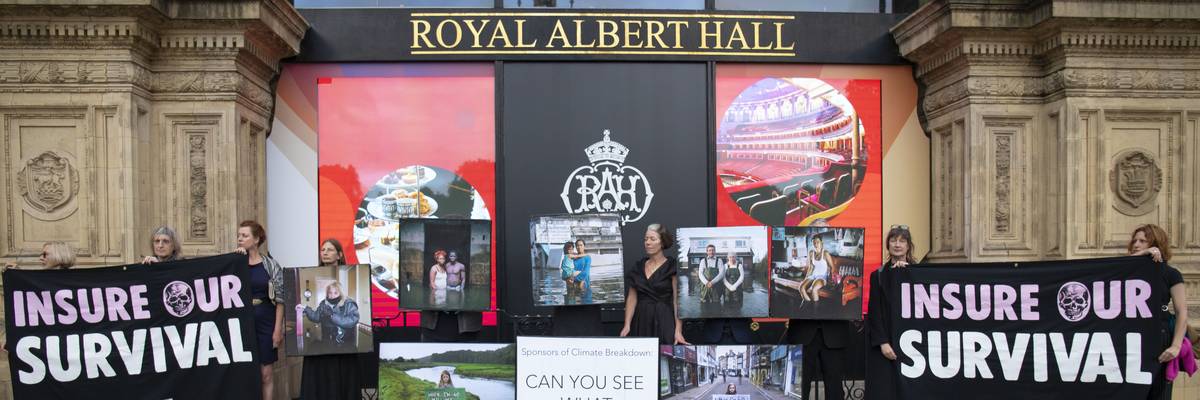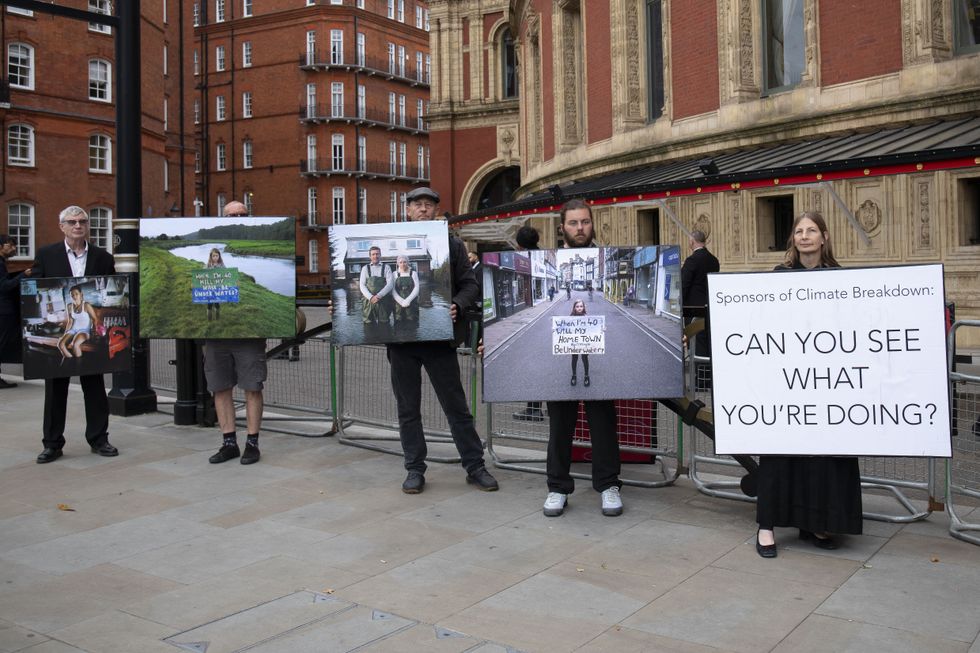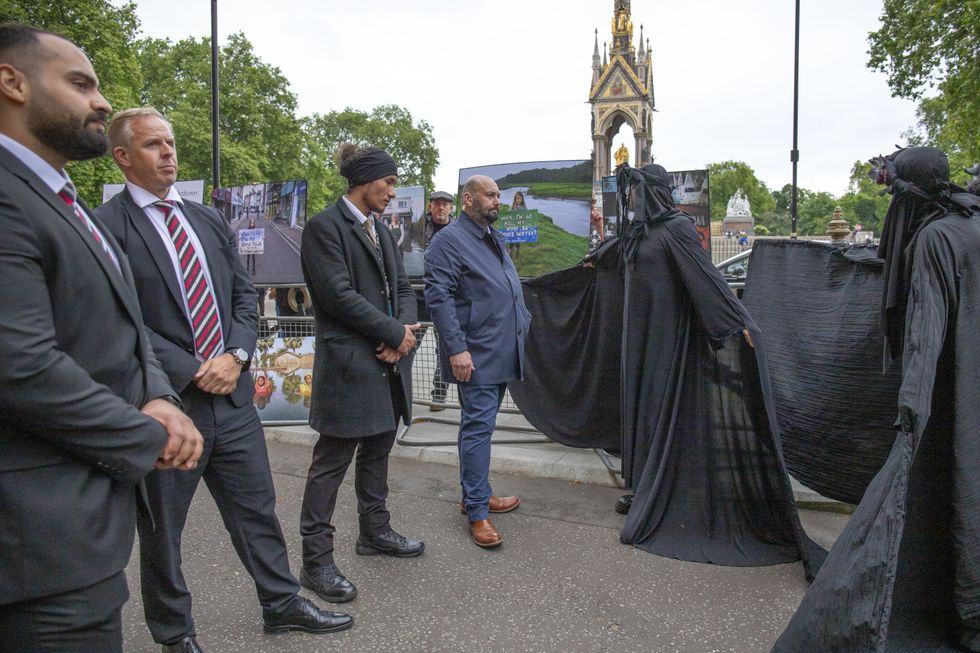

SUBSCRIBE TO OUR FREE NEWSLETTER
Daily news & progressive opinion—funded by the people, not the corporations—delivered straight to your inbox.
5
#000000
#FFFFFF
To donate by check, phone, or other method, see our More Ways to Give page.


Daily news & progressive opinion—funded by the people, not the corporations—delivered straight to your inbox.

Extinction Rebellion activists protest the British Insurance Awards at the Royal Albert Hall in London on July 3, 2024.
"We left the leading lights of the industry in no doubt about what they need to do: Stop insuring new oil, gas, and coal and focus on underwriting renewable energy," one activist said.
Key industry players arriving at London's Royal Albert Hall Wednesday night for the British Insurance Awards were met with a warning: Stop underwriting new oil, gas, and coal projects or face direct action from Extinction Rebellion.
Climate activists greeted the insurers with signs, photographs of extreme U.K. flooding, protest music, performance art, and business cards announcing XR's new "Insure Our Survival" campaign to pressure the industry away from backing fossil fuels.
"This is just the beginning," Insure Our Survival spokesperson Alex Penson said in a statement. "Thousands of XR activists stand ready to focus their nonviolent direct action energy on the insurance firms who are greenlighting the climate crisis by providing fossil fuel crooks with the insurance they need to dig and drill for oil, gas, and coal."
"It's time for insurers to use their superpower or be held responsible when all of our children face a future like the children in the photographs we showed at our protest,"
The insurance industry has emerged as a target of the climate movement in recent years, as advocates point out that new fossil fuel projects would not be able to move forward without it.
"The insurance industry has a superpower," Penson said. "At a stroke, it could stop the fossil fuel crooks in their tracks and save the lives of billions of people threatened from the worst-case climate scenarios that scientists are saying are increasingly possible."
However, to date the industry has not chosen to use that power. According to the most recent report from the global Insure Our Future campaign, not one of the 30 major insurance firms it analyzed in 2023 had policies in line with limiting global heating to 1.5°C above preindustrial levels. The insurers included in the U.K.-based Lloyd's market were the leading fossil fuel insurers, Insure Our Future found, earning $1.6-2.2 billion in premiums from oil, gas, and coal in 2022.
"It's time for insurers to use their superpower or be held responsible when all of our children face a future like the children in the photographs we showed at our protest," Penson continued, "struggling to survive in barely habitable countries haunted by crop failures, malnutrition, deadly storms, floods, and heatwaves."
At Wednesday's event, XR activists held up photos taken by photographer Gideon Mendell, showing massive flooding in the U.K. that has been made worse by the climate emergency. They also held up signs reading, "Stop Insuring New Fossil Fuels" and "Insure Our Survival."

At the sound of a violin, XR's Oil Slickers—activists draped in black cloth to resemble an oil spill—glided around the insurance luminaries as they approached the hall for the industry's annual awards ceremony.

A choir also sang a song to the tune of "Imagine," including the line, "Imagine all insurers, fighting for us all."
"Last night we challenged insurers having a good time and congratulating each other on their good work at the Royal Albert Hall to face up to some uncomfortable truths—that some of their work leads to flooded homes and wrecked lives for their customers facing more and more climate crisis-driven extreme weather events," Penson said.
The activists also distributed business cards to the attendees warning them that, if they continued to back new fossil fuel projects, XR would target them with direct action designed to hurt both their reputations and their bottom line.
Pension said: "We left the leading lights of the industry in no doubt about what they need to do: Stop insuring new oil, gas, and coal and focus on underwriting renewable energy to speed a just transition to a low or no-carbon economy."
XR's U.K.-based Insure Our Survival campaign emerged from the global Insure Our Future campaign, and in particular an international week of action it organized in late February and early March, including events in London and around the U.K.
About a month after the protests, Zurich Insurance announced that it would no longer underwrite new oil and gas projects.
Sierra Signorelli, Zurich's chief executive of commercial insurance, said at the time that Zurich took the action in keeping with its goal of reaching net-zero emissions by 2050.
"Further exploration and development of fossil fuels isn't required for the transition," Signorelli said. "We think it's the right time to evolve our position."
Insure Our Survival campaigner Lucy Porter said that since the spring, many insurance employees, in both senior and junior positions, had spoken to XR saying they supported a move away from backing climate-polluting projects.
"We intend to work with them to make insurance part of the climate solution, not part of the problem, and we invite other people in the industry to contact us and work with us," Porter said.
Porter continued, "To those who continue to put their profits before a livable planet we say: We will hold you accountable through an escalating campaign of nonviolent direct action across the country."
Dear Common Dreams reader, The U.S. is on a fast track to authoritarianism like nothing I've ever seen. Meanwhile, corporate news outlets are utterly capitulating to Trump, twisting their coverage to avoid drawing his ire while lining up to stuff cash in his pockets. That's why I believe that Common Dreams is doing the best and most consequential reporting that we've ever done. Our small but mighty team is a progressive reporting powerhouse, covering the news every day that the corporate media never will. Our mission has always been simple: To inform. To inspire. And to ignite change for the common good. Now here's the key piece that I want all our readers to understand: None of this would be possible without your financial support. That's not just some fundraising cliche. It's the absolute and literal truth. We don't accept corporate advertising and never will. We don't have a paywall because we don't think people should be blocked from critical news based on their ability to pay. Everything we do is funded by the donations of readers like you. Will you donate now to help power the nonprofit, independent reporting of Common Dreams? Thank you for being a vital member of our community. Together, we can keep independent journalism alive when it’s needed most. - Craig Brown, Co-founder |
Key industry players arriving at London's Royal Albert Hall Wednesday night for the British Insurance Awards were met with a warning: Stop underwriting new oil, gas, and coal projects or face direct action from Extinction Rebellion.
Climate activists greeted the insurers with signs, photographs of extreme U.K. flooding, protest music, performance art, and business cards announcing XR's new "Insure Our Survival" campaign to pressure the industry away from backing fossil fuels.
"This is just the beginning," Insure Our Survival spokesperson Alex Penson said in a statement. "Thousands of XR activists stand ready to focus their nonviolent direct action energy on the insurance firms who are greenlighting the climate crisis by providing fossil fuel crooks with the insurance they need to dig and drill for oil, gas, and coal."
"It's time for insurers to use their superpower or be held responsible when all of our children face a future like the children in the photographs we showed at our protest,"
The insurance industry has emerged as a target of the climate movement in recent years, as advocates point out that new fossil fuel projects would not be able to move forward without it.
"The insurance industry has a superpower," Penson said. "At a stroke, it could stop the fossil fuel crooks in their tracks and save the lives of billions of people threatened from the worst-case climate scenarios that scientists are saying are increasingly possible."
However, to date the industry has not chosen to use that power. According to the most recent report from the global Insure Our Future campaign, not one of the 30 major insurance firms it analyzed in 2023 had policies in line with limiting global heating to 1.5°C above preindustrial levels. The insurers included in the U.K.-based Lloyd's market were the leading fossil fuel insurers, Insure Our Future found, earning $1.6-2.2 billion in premiums from oil, gas, and coal in 2022.
"It's time for insurers to use their superpower or be held responsible when all of our children face a future like the children in the photographs we showed at our protest," Penson continued, "struggling to survive in barely habitable countries haunted by crop failures, malnutrition, deadly storms, floods, and heatwaves."
At Wednesday's event, XR activists held up photos taken by photographer Gideon Mendell, showing massive flooding in the U.K. that has been made worse by the climate emergency. They also held up signs reading, "Stop Insuring New Fossil Fuels" and "Insure Our Survival."

At the sound of a violin, XR's Oil Slickers—activists draped in black cloth to resemble an oil spill—glided around the insurance luminaries as they approached the hall for the industry's annual awards ceremony.

A choir also sang a song to the tune of "Imagine," including the line, "Imagine all insurers, fighting for us all."
"Last night we challenged insurers having a good time and congratulating each other on their good work at the Royal Albert Hall to face up to some uncomfortable truths—that some of their work leads to flooded homes and wrecked lives for their customers facing more and more climate crisis-driven extreme weather events," Penson said.
The activists also distributed business cards to the attendees warning them that, if they continued to back new fossil fuel projects, XR would target them with direct action designed to hurt both their reputations and their bottom line.
Pension said: "We left the leading lights of the industry in no doubt about what they need to do: Stop insuring new oil, gas, and coal and focus on underwriting renewable energy to speed a just transition to a low or no-carbon economy."
XR's U.K.-based Insure Our Survival campaign emerged from the global Insure Our Future campaign, and in particular an international week of action it organized in late February and early March, including events in London and around the U.K.
About a month after the protests, Zurich Insurance announced that it would no longer underwrite new oil and gas projects.
Sierra Signorelli, Zurich's chief executive of commercial insurance, said at the time that Zurich took the action in keeping with its goal of reaching net-zero emissions by 2050.
"Further exploration and development of fossil fuels isn't required for the transition," Signorelli said. "We think it's the right time to evolve our position."
Insure Our Survival campaigner Lucy Porter said that since the spring, many insurance employees, in both senior and junior positions, had spoken to XR saying they supported a move away from backing climate-polluting projects.
"We intend to work with them to make insurance part of the climate solution, not part of the problem, and we invite other people in the industry to contact us and work with us," Porter said.
Porter continued, "To those who continue to put their profits before a livable planet we say: We will hold you accountable through an escalating campaign of nonviolent direct action across the country."
Key industry players arriving at London's Royal Albert Hall Wednesday night for the British Insurance Awards were met with a warning: Stop underwriting new oil, gas, and coal projects or face direct action from Extinction Rebellion.
Climate activists greeted the insurers with signs, photographs of extreme U.K. flooding, protest music, performance art, and business cards announcing XR's new "Insure Our Survival" campaign to pressure the industry away from backing fossil fuels.
"This is just the beginning," Insure Our Survival spokesperson Alex Penson said in a statement. "Thousands of XR activists stand ready to focus their nonviolent direct action energy on the insurance firms who are greenlighting the climate crisis by providing fossil fuel crooks with the insurance they need to dig and drill for oil, gas, and coal."
"It's time for insurers to use their superpower or be held responsible when all of our children face a future like the children in the photographs we showed at our protest,"
The insurance industry has emerged as a target of the climate movement in recent years, as advocates point out that new fossil fuel projects would not be able to move forward without it.
"The insurance industry has a superpower," Penson said. "At a stroke, it could stop the fossil fuel crooks in their tracks and save the lives of billions of people threatened from the worst-case climate scenarios that scientists are saying are increasingly possible."
However, to date the industry has not chosen to use that power. According to the most recent report from the global Insure Our Future campaign, not one of the 30 major insurance firms it analyzed in 2023 had policies in line with limiting global heating to 1.5°C above preindustrial levels. The insurers included in the U.K.-based Lloyd's market were the leading fossil fuel insurers, Insure Our Future found, earning $1.6-2.2 billion in premiums from oil, gas, and coal in 2022.
"It's time for insurers to use their superpower or be held responsible when all of our children face a future like the children in the photographs we showed at our protest," Penson continued, "struggling to survive in barely habitable countries haunted by crop failures, malnutrition, deadly storms, floods, and heatwaves."
At Wednesday's event, XR activists held up photos taken by photographer Gideon Mendell, showing massive flooding in the U.K. that has been made worse by the climate emergency. They also held up signs reading, "Stop Insuring New Fossil Fuels" and "Insure Our Survival."

At the sound of a violin, XR's Oil Slickers—activists draped in black cloth to resemble an oil spill—glided around the insurance luminaries as they approached the hall for the industry's annual awards ceremony.

A choir also sang a song to the tune of "Imagine," including the line, "Imagine all insurers, fighting for us all."
"Last night we challenged insurers having a good time and congratulating each other on their good work at the Royal Albert Hall to face up to some uncomfortable truths—that some of their work leads to flooded homes and wrecked lives for their customers facing more and more climate crisis-driven extreme weather events," Penson said.
The activists also distributed business cards to the attendees warning them that, if they continued to back new fossil fuel projects, XR would target them with direct action designed to hurt both their reputations and their bottom line.
Pension said: "We left the leading lights of the industry in no doubt about what they need to do: Stop insuring new oil, gas, and coal and focus on underwriting renewable energy to speed a just transition to a low or no-carbon economy."
XR's U.K.-based Insure Our Survival campaign emerged from the global Insure Our Future campaign, and in particular an international week of action it organized in late February and early March, including events in London and around the U.K.
About a month after the protests, Zurich Insurance announced that it would no longer underwrite new oil and gas projects.
Sierra Signorelli, Zurich's chief executive of commercial insurance, said at the time that Zurich took the action in keeping with its goal of reaching net-zero emissions by 2050.
"Further exploration and development of fossil fuels isn't required for the transition," Signorelli said. "We think it's the right time to evolve our position."
Insure Our Survival campaigner Lucy Porter said that since the spring, many insurance employees, in both senior and junior positions, had spoken to XR saying they supported a move away from backing climate-polluting projects.
"We intend to work with them to make insurance part of the climate solution, not part of the problem, and we invite other people in the industry to contact us and work with us," Porter said.
Porter continued, "To those who continue to put their profits before a livable planet we say: We will hold you accountable through an escalating campaign of nonviolent direct action across the country."